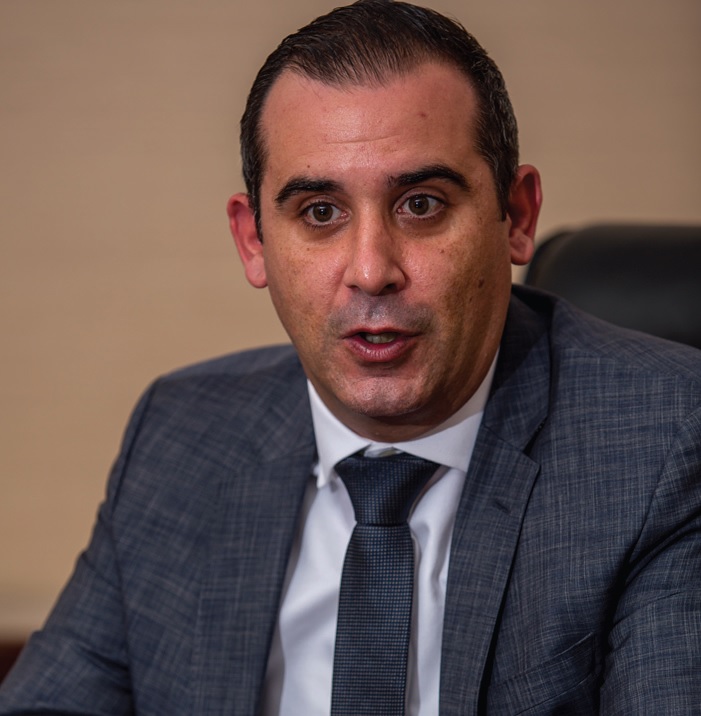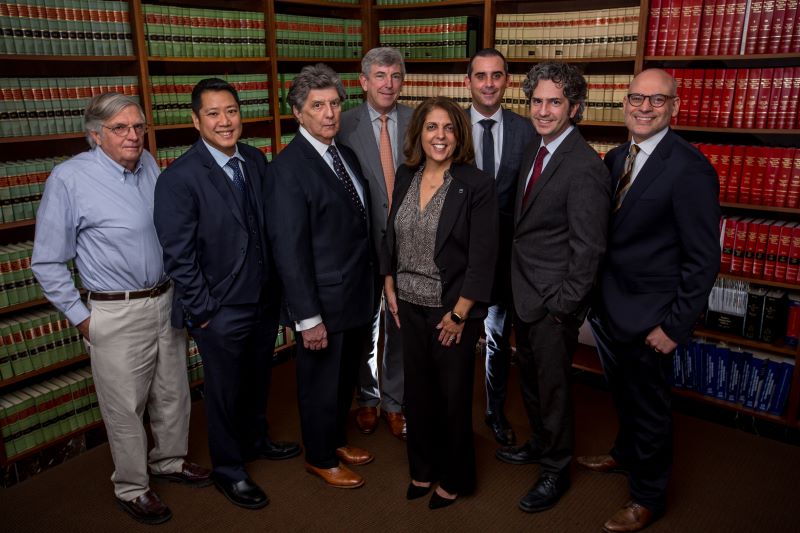From left: The Genova Burns LLC commercial real estate team includes William F. Harrison, John Suwatson, Eugene T. Paolino, Jeffrey R. Rich, Jennifer Mazawey, Gerard D. Pizzillo, Matthew Kertz and Avi D. Kelin. Not pictured: Attorneys Ralph J. Salerno and Bruno Genova — Photos by Aaron Houston for Real Estate NJ
By Joshua Burd
Commercial real estate lawyers may well be the first call for developers and property owners, but their conversations with clients have undoubtedly changed in recent months. Just ask the real estate team at Genova Burns.

“There’s more caution in the marketplace,” said Jeff Rich, chair of the firm’s commercial real estate and redevelopment law practice group, citing a lag in lending activity. “People are slower to pull the trigger on a deal — maybe they’re waiting to see if the rates are going to fluctuate favorably — but there’s definitely a slowdown in the market in that regard.”
Genova Burns, home to one of the state’s most prominent real estate practices, is as busy and as integral to the industry as it was before the pandemic and before the Federal Reserve began to raise interest rates last year. Increasingly, though, the Newark-based firm is helping clients either play defense or guide them through this period of uncertainty.
Interest rates have impacted everything from new development to investment sales, the attorneys said. That’s not to mention the lingering effects of COVID-19 and the slow rollout of new state incentive and gap financing programs, which they say are critical in times of economic turmoil.
Legal teams at Genova Burns and elsewhere are navigating those challenges while also tapping into growth areas in New Jersey’s commercial real estate sector, from film and television studio facilities to the legalization of adult use cannabis.

“We’re now seeing the fruits of that regulatory scheme in the real estate space,” said Jennifer Mazawey, a partner and longtime land use attorney with the firm, referring to the cannabis market. She added: “I think that’s an industry that’s not slowing down because it’s so new, it still needs to mature … so that will continue to be a good source of work for real estate lawyers.”
The Genova Burns real estate practice has handled some $4.85 billion in transactions over the last two years, the firm said. Real Estate NJ recently sat down with the team to discuss the state of the market, how clients are coping with economic headwinds and reasons for optimism in a time of unease.
Development
In Jersey City, the home of the state’s most prolific development pipeline, rising interest rates have caused some builders to tap the brakes on sweeping, multiphase projects that have flourished in past years. Eugene Paolino, who represents some of the city’s most active multifamily builders, said clients that have already received approvals are weighing whether to redesign or reduce the size of a project or modify their schedule to lessen their risk.

“It is a constant attempt to address the market,” said Paolino, a partner in Genova’s land use and approvals and commercial real estate and redevelopment groups. That can mean anything from adding studio or one-bedroom units or considering a pivot to for-sale condominiums, which he believes is an underserved market in recent years.
“The developers are all looking to that market,” he added, referring to Jersey City, “and I constantly worry about the issue of saturation. What is the saturation point? When is the next project going to go up in which they don’t rent at a rate of 50 units a month? But that hasn’t happened, at least in Jersey City.”
That’s not to say New Jersey’s development pipeline is drying up any time soon.

“One of the interesting things is that developers have learned from past economic hiccups, and most of them are pursuing the approval process and getting their entitlements in place, because they know how long it takes,” said Bill Harrison, a partner and chair of the firm’s environmental law and land use and approvals groups. “They’re marching along (securing state and local permits), so I’m busier than ever.”
As the Genova Burns team noted, the pandemic has changed the entitlement process by allowing residents to participate virtually in local land use hearings. That has only expanded the pool of vocal opposition or support for projects, the firm’s Gerard Pizzillo said, and there’s nothing to suggest that Zoom hearings are going away in the near term.
That has made it more important to engage the community earlier in a project and even before a formal formal land use application, through open houses and other venues.

“We’ve always counseled our clients — although it’s not a requirement — it’s always good practice to meet with the communities early on, introduce who you are and what the project is and have us take the heat in those meetings, as opposed to having it all aired out at the planning board hearing,” said Pizzillo, counsel with Genova, whose practice includes redevelopment and land use.
“The project, from our legal standpoint or from an architectural standpoint, may be a slam dunk,” he added. “But when you have 50 people coming out speaking their mind … and they could do it from their couch, they could do it from their car, it could sway people’s votes now.”
Incentives
Also looming large is the lack of functioning state incentives for large-scale, mixed-use developments, the attorneys said. Among the subsidies created under a law signed by Gov. Phil Murphy in January 2021 was Aspire, a gap financing tool meant to succeed the Economic Redevelopment and Growth program that lapsed in mid-2019, but state officials have been slow to adopt regulations for the new offering.
That means developers and municipalities have effectively been without a potent gap financing program for several years.
“No one wants to say it was OK, but it was less difficult to deal with or manage because interest rates were so low, so gaps for projects were much smaller,” Mazawey said. “But now as the interest rates go up, your rents might not be increasing at the same rate. And now that gap is getting bigger and bigger.”
She agreed that projects are locking in approvals, “but those projects are not going to move from entitlement to building permits and beyond” because they will be hard-pressed to find debt and equity financing.
“There’s a lot of activity in Newark,” she added. “The planning board is very busy. You go on any week and their agendas are full … but I’m not sure that those projects — the bigger, more aggressive projects — are going to get built without an incentive program that works and will allow developers to actually use the credits that are there.”

Lending
Lenders and borrowers will face their own challenges. Rich, whose practice includes banking and commercial lending, pointed to pre-pandemic loans that were booked on three- or five-year terms that are now up for renewals or extensions. Those borrowers are now subject to higher interest rates and may have less income on their properties, especially in the case of office buildings, “so a lot of the existing debt service coverage ratios that are currently in place are going to be out of compliance.”
“That’s going to open up the door for a lot of loan modification work, potentially,” Rich said. “If property owners can’t put additional equity in to right-size the loan for those compliance requirements, they may end up having to sell the asset at a distress sale. You may end up looking at a bankruptcy scenario, depending on what the income flow is at the property.
“So there are a lot of challenges that are on the horizon that lenders are going to have to deal with, as well as the property owners.”
Leasing

Industrial leasing activity is still robust, but the economy is creating additional tension between owners and occupiers. Matthew Kertz, a Genova Burns partner and leasing specialist, said landlords “are trying to push increasingly restrictive terms in their leases because they’ve been bit by issues in the past, especially when tenants tried to get out of their leases in COVID or (because of) property being left in a certain condition.” Tenants, on the other hand, are pushing back, especially in the case of aging buildings that have deferred maintenance or environmental concerns.
“A lot of these old warehouses are in poor condition and, in a lot of industrial leases where you’ve seen the landlords say, ‘Take it or leave it,’ the tenants are increasingly saying, ‘No, we need assurances relating to whether the roof is watertight, whether the structure of the foundation is sound,’” Kertz said. “I think it’s a question of leverage and I think it’s also a question of sophistication. Tenants, at least the ones that are coming to us, are starting to be aware that these issues are out there and seeing what we can do about them.”
Growth areas

In the meantime, Genova Burns’ real estate team is poised to expand with the help of several key growth areas. They include the rush to build new film and television production studio space, Counsel Avi Kelin said, citing a reported two-year backlog for stage time in the industry.
That was evident in 2022 from headlines about major studio projects in Newark, Bayonne, Carteret and Fort Monmouth, where Netflix is slated to invest more than $900 million. Kelin, who worked on the 112,400-square-foot, purpose-built Cinelease Studios in Jersey City’s Caven Point section, said the rush to build new facilities is primed to continue.
“It’s already here, but I think it’s going to be more prominent in the next couple years as we see the infrastructure needed for the film industry try to catch up,” he said. “And I think the nice part about that industry is that the economic benefits really flow through to the mom-and-pop stores, so if you’re a caterer near the studio, you can keep yourself busy and support your family for a year just on catering a TV show.”
The team is also banking on the rise of the recreational cannabis market, which became legal in New Jersey in February 2021, with the market officially launching last April. John Suwatson, counsel with the firm, said there is an uptick in buyers seeking properties for either cannabis retail space or production facilities. And while there is still a conflict between state and federal law over whether marijuana is a controlled substance, they’re now finding a clearer path toward completing those deals.

“Title companies would say, ‘We’re not going to deal with this, just because of the risk of the federal and state conflict, and we don’t want to be involved in that,” Suwatson said. “But you’re seeing title companies coming around.”
The same is becoming true for lenders, he added.
“We’ve been hearing that more New Jersey-centric banks and lenders are willing to go into that space,” he said. “So you’re seeing the hurdles coming down and people being more accepting of cannabis.”










